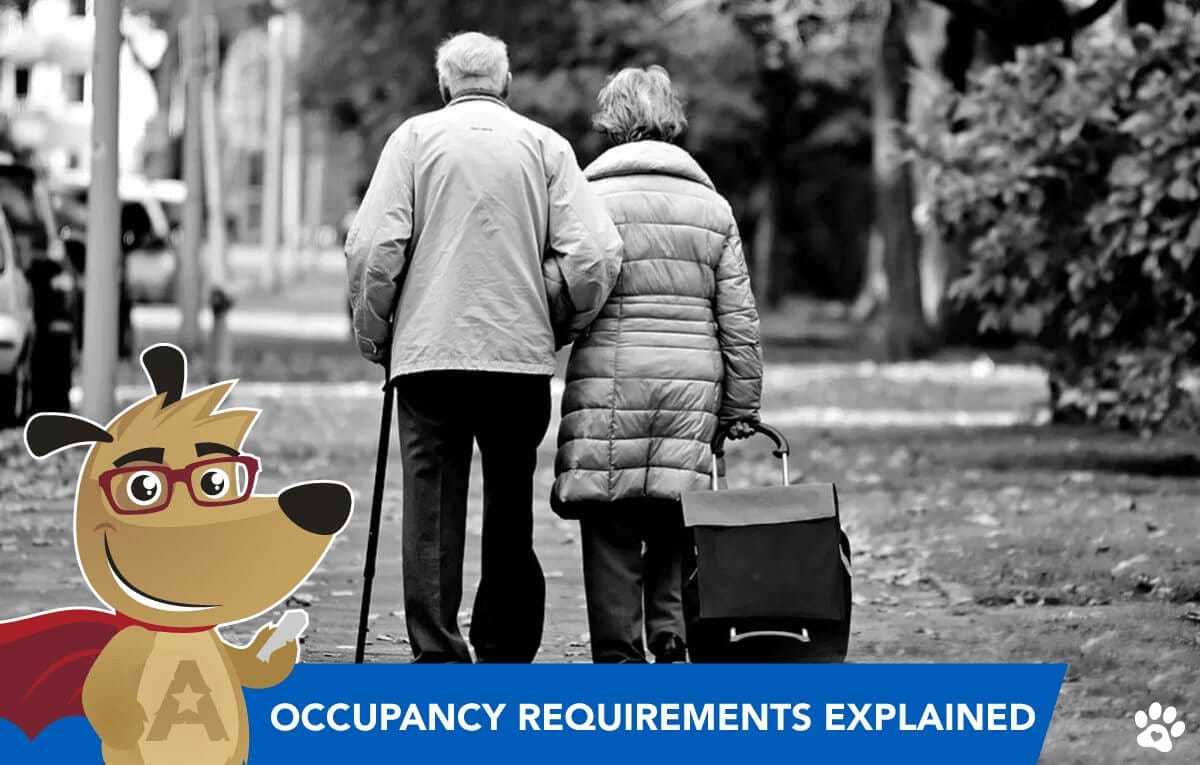Reverse Mortgage Occupancy Requirements Explained
 |
Michael G. Branson, CEO of All Reverse Mortgage, Inc., and moderator of ARLO™, has 45 years of experience in the mortgage banking industry. He has devoted the past 20 years to reverse mortgages exclusively. (License: NMLS# 14040) |
 |
All Reverse Mortgage's editing process includes rigorous fact-checking led by industry experts to ensure all content is accurate and current. This article has been reviewed, edited, and fact-checked by Cliff Auerswald, President and co-creator of ARLO™. (License: NMLS# 14041) |
We live with my mother-in-law and were present throughout the process of her getting a reverse mortgage. The broker is fully aware that we live there with her, help keep up the property, and pay living expenses. He told us if she ever needed to go to a nursing home, if she was in the home at least once a month, they would not recall the loan. What I am reading here seems contradictory to what we were told. We were also told about having 12 months to sell or purchase the property upon death. I am just confused about the nursing home situation now after reading this. -Amy

Occupancy Requirements in Reverse Mortgage Loan Agreement
I cannot comment on what was said or not said by another originator, as I was not present for the conversation. However, I have always been very honest with my borrowers and their families.
The loan documents make the legal agreement between the borrower and the lender. The home’s occupancy as the borrower’s principal residence is outlined as a requirement in the three main legal documents: the Note, the Deed of Trust or Mortgage (depending on which instrument your state uses), and the Security Agreement.
I am looking specifically at a Deed of Trust, but all the states have similar wording on their Deeds and Mortgages, and they define the property as no longer being the principal residence when:
The property ceases to be the principal residence of a Borrower for reasons other than death, and the property is not the principal residence of at least one other borrower; or for a period of longer than twelve (12) consecutive months, a Borrower fails to occupy the property because of physical or mental illness and the property is not the principal residence or at least one other borrower.
It sounds like the broker may have been counting entirely on the 12 consecutive months and not paying attention to the “Principal Residence” requirement. The Promissory Note contains similar language in that it states that the lender may require immediate repayment in full if:
The property ceases to be a Borrower’s principal residence for reasons other than death, and the property is not the principal of at least one other borrower.
So, what qualifies as the “Principal Residence”? This is explicitly defined in the Security Agreement. Item 1.8 states:
Principal residence means the dwelling where the borrower shall maintain his or her permanent place of abode and typically spends the majority of the calendar year. A person may have only one principal residence at a time. The property shall be considered the Principal Residence of any Borrower who is temporarily or permanently in a health care institution as long as the property is the Principal Residence of at least one other Borrower who is not in a health care institution. (emphasis added)
Definition of Principal Residence
A principal residence is the location where an individual spends most of the year. This includes considerations for periods spent in mental or physical health facilities. The specifics of what constitutes a principal residence are typically outlined in loan documents.
Occupancy Requirements for Reverse Mortgages
For a property to qualify for a reverse mortgage, it must be the borrower’s primary residence, not just occupied for one month out of the year. If advised otherwise, such information is erroneous.
Temporary Absence and Owner-Occupancy
In cases where an individual, such as a mother-in-law, temporarily moves into a nursing home, they can be absent for up to 12 months. Beyond this period, the absence may be considered permanent, and the home must be occupied most of the year to maintain its status as owner-occupied.
Loan Repayment and Property Disposal Time Frame
If a lender calls a loan due because the property is no longer owner-occupied, there is no specific timeframe for repayment. The process often depends on various factors, including efforts to sell or refinance the home and the property’s condition. Approximately 12 months are typically allocated to dispose of the property, although this timeframe can vary.
Heirs’ Responsibility and Lender’s Preference
The lender generally prefers this if the borrower’s heirs are actively trying to sell or refinance the property. However, if the heirs show no intention to sell and the property’s condition deteriorates, the lender may expedite their actions.
Foreclosure Timelines and Communication Importance
Foreclosure proceedings, if initiated, can take many months. The duration often depends on state laws and the specific circumstances, such as the period the borrower has been absent and the heirs’ intentions. Effective communication with the lender is crucial in these scenarios to potentially extend time frames and find agreeable solutions.
Occupancy FAQs
Do you have to live in a home with a reverse mortgage?
What happens if I move out of my home while I have a reverse mortgage?
How long can I be away from the property when I have a reverse mortgage?
How long can my heir live on the property after I die?
How quickly do I move into the property after buying it with a reverse mortgage?
If you have a reverse mortgage, can a relative live with you?

ARLO recommends these helpful resources:




 Michael G. Branson
Michael G. Branson Cliff Auerswald
Cliff Auerswald

November 10th, 2025
November 10th, 2025
October 17th, 2025
October 17th, 2025
September 4th, 2024
September 4th, 2024
November 3rd, 2023
November 3rd, 2023
March 19th, 2024
March 25th, 2024
September 20th, 2023
September 20th, 2023
July 3rd, 2023
July 3rd, 2023
June 23rd, 2023
June 23rd, 2023
May 6th, 2023
May 6th, 2023
February 15th, 2023
February 15th, 2023
December 15th, 2022
December 15th, 2022
December 15th, 2022
December 16th, 2022
November 4th, 2022
November 4th, 2022
September 27th, 2022
September 27th, 2022
August 17th, 2022
August 28th, 2022
August 16th, 2022
August 16th, 2022
June 13th, 2022
June 13th, 2022
March 22nd, 2022
March 22nd, 2022
September 1st, 2021
September 9th, 2021
August 10th, 2021
August 10th, 2021
April 16th, 2021
April 19th, 2021
April 13th, 2021
April 13th, 2021
January 25th, 2021
January 25th, 2021
December 15th, 2020
December 15th, 2020
October 7th, 2020
October 7th, 2020
September 1st, 2020
September 1st, 2020
August 10th, 2020
August 10th, 2020
June 23rd, 2020
June 23rd, 2020
June 8th, 2020
June 8th, 2020
February 10th, 2020
February 10th, 2020
January 16th, 2020
January 16th, 2020
November 13th, 2019
November 13th, 2019
September 18th, 2019
September 18th, 2019
September 4th, 2019
September 4th, 2019
June 29th, 2019
June 29th, 2019
April 23rd, 2019
April 23rd, 2019
March 26th, 2019
March 26th, 2019
June 19th, 2017
June 19th, 2017